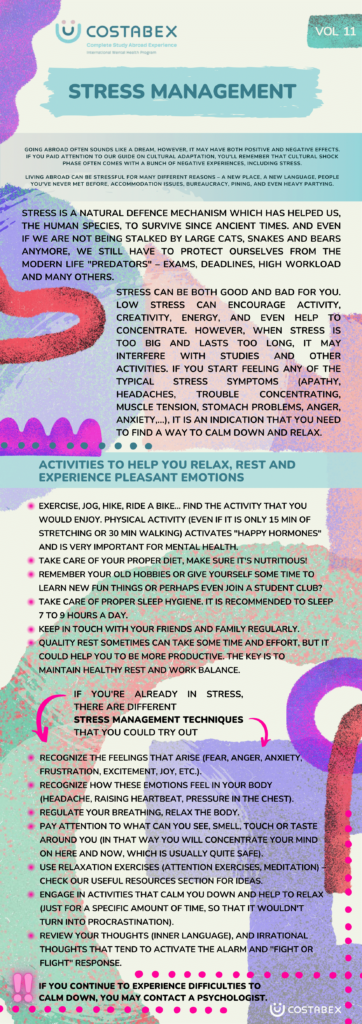Going abroad often sounds like a dream, however, it may have both positive and negative effects. If you paid attention to our guide on cultural adaptation, you‘ll remember that cultural shock phase often comes with a bunch of negative experiences, including stress. Living abroad can be stressful for many different reasons – a new place, a new language, people you‘ve never met before, accommodation issues, bureaucracy, pining, and even heavy partying.
Stress is a natural defence mechanism which has helped us, the human species, to survive since ancient times. And even if we are not being stalked by large cats, snakes and bears anymore, we still have to protect ourselves from the modern life „predators“ – exams, deadlines, high workload and many others.
Stress can be both good and bad for you. Low stress can encourage activity, creativity, energy, and even help to concentrate. However, when stress is too big and lasts too long, it may interfere with studies and other activities. If you start feeling any of the typical stress symptoms (apathy, headaches, trouble concentrating, muscle tension, stomach problems, anger, anxiety,…), it is an indication that you need to find a way to calm down and relax.
Activities to help you relax, rest and experience pleasant emotions:
- Exercise, jog, hike, ride a bike… Find the activity that you would enjoy. Physical activity (even if it is only 15min of stretching or 30min walking) activates „happy hormones“ and is very important for mental health.
- Take care of your proper diet, make sure it’s nutritious!
- Remember your old hobbies or give yourself some time to learn new fun things or perhaps even join a student club?
- Take care of proper sleep hygiene. It is recommended to sleep 7 to 9 hours a day.
- Keep in touch with your friends and family regularly.
- Quality rest sometimes can take some time and effort, but it could help you to be more productive. The key is to maintain healthy rest and work balance.
If you‘re already in stress, there are different stress management techniques that you could try out:
- Recognize the feelings that arise (fear, anger, anxiety, frustration, excitement, joy, etc).
- Recognize how these emotions feel in your body (headache, raising heartbeat, pressure in the chest).
- Regulate your breathing, relax the body.
- Pay attention to what can you see, smell, touch or taste around you (in that way you will concentrate your mind on here and now, which is usually quite safe).
- Use relaxation exercises (attention exercises, meditation) – check our useful resources section for ideas.
- Engage in activities that calm you down and help to relax (just for a specific amount of time, so that it wouldn’t turn into procrastination).
- Review your thoughts (inner language), and irrational thoughts that tend to activate the alarm and “fight or flight” response.
If you continue to experience difficulties to calm down, you may contact a psychologist.
Useful resources:
- COSTABEX video and training on stress management: https://costabex.eu/stress-management/
- COSTABEX meditation audios: https://costabex.eu/meditation-audios/
- World Health Organisation stress management guide for coping with adversity: https://www.who.int/publications/i/item/9789240003927
- Mental Health tips from ESN: https://blog.erasmusgeneration.org/5-mental-health-tips-erasmus-students

